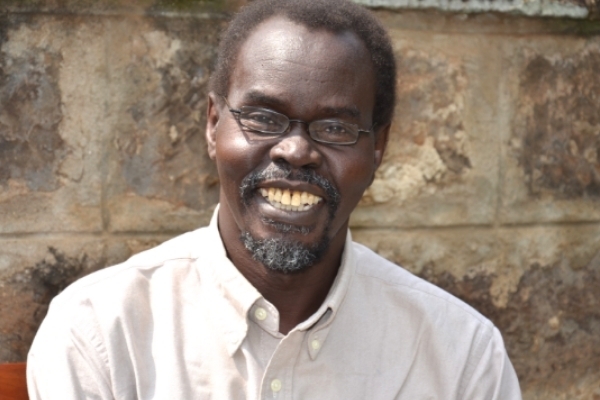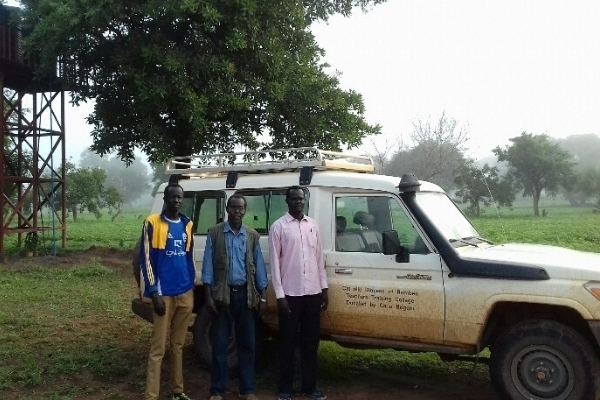
Dedicated to the life of Fr Victor-Luke Odhiambo SJ, RIP, 1956 – 2018
South Sudan is a beautiful country; intense, scarred and complex. I spent a month there in July – August 2018 for the Xavier Network, a global network of Jesuit Mission Offices and development initiatives which is supporting projects in the world’s newest state. When I first drafted this article reflecting on my experiences there, I felt a deep conviction despite the pessimism of many commentators to write from a perspective of hope. In every brutal situation, without exception, there are always many good people and many positive dynamics at work. It is important to honour the dignity of a country and its people and God in the midst of all by protecting and nourishing all and any signs of hope.
Having received the news that Fr Victor-Luke Odhiambo, SJ one of our Jesuit colleagues in Cueibet was murdered by unknown assailants in the early hours of 15 November, I am more determined than ever to write from a perspective of hope. To do so is to honour him, his courage, his integrity, his good humour. He dedicated long years of his life in service to the people of South Sudan and to the cause of peace.
He was the Principal of the small Teacher Training College in Cueibet, a part of South Sudan with a history of serious inter-clan conflict which impacts every facet of life. The teacher training college run by the Jesuits in collaboration with the Catholic Diocese of Rumbek since November 2014, has stubbornly remained open through years of conflict to represent an alternative and hopeful vision for the future. Statistics gathered from the Diocese of Rumbek Education Secretariat in August 2018 revealed there are 39,189 students in schools across the diocese being taught by only 237 trained teachers and 762 untrained teachers. In many primary and secondary schools, the teachers themselves are not formally trained. The college was established to contribute to addressing the huge need for trained teachers, and, to contribute to social transformation in this hinterland area that has known so much pain and suffering.

Fr Odhiambo spoke Dinka fluently. It is the language of the local Dinka people and South Sudan’s biggest ethnic group. Local people knew and respected him for that. He was dedicated to the safety, wellbeing and education of the students in the Teacher Training College. I remember going to the small outdoor market with him very early one morning as the mist was still rising, to buy vegetables for the students’ lunch and evening meal. Everyone in the market knew and greeted him. We moved around the little wooden stalls relieving the women of their okra stocks. When the deals were done, each of the women, threw a few extra pieces of okra into our bags with a smile. This was the equivalent of an Irish luck penny! It was a simple gesture that spoke volumes.
Later that evening Fr Odhiambo pulled out the blueprints for the future development of the College which he was excited to chat about. It was in the early hours of the morning before we finished the conversation, having noted down all the priorities for the College he wanted to advance in 2019. Amongst these priorities was a new in-service teacher training programme for untrained teachers in the local schools. These were teachers who were keen to learn but could not dedicate themselves to the full time pre-service teacher training programme.
He also wanted to establish a small hardship fund to help students dedicated to the full-time training programme but who struggled to meet their own basic needs. The man who was affectionately know as ‘The Professor’ inspired, encouraged and protected me during my short visit to Cueibet, as he had done countless others during his many years of service in South Sudan.
The slow work of social transformation
Much damage has been inflicted on the physical, mental, emotional and spiritual wellbeing of the people over many years. A lot of fear, anger and unprocessed grief remains. What is currently being experienced is a crisis of transition from one type of social order and governance to another. Traditional systems of authority have not yet been replaced by strong civil governance of a kind that must be underpinned by respect for human rights for all. This must be home- grown in South Sudan; it cannot ever be imported.
The old ways still dominate but new ways are also suggesting themselves, especially to the young who, given an opportunity are working hard to educate themselves. They are less willing to accept the nepotism. They are proud of their tribal identity and inheritance but do not want to get caught up in destructive and dehumanising tribalism. The South Sudanese have a saying ‘Even if a log lies in the water for a long time, it does not become a crocodile’.
Transformation of hearts, mindsets and opportunities will take time and the contribution of many wise and patient people like Fr Odhiambo along the way. Those who know what it takes to deeply commit to people and place and the slow, often dangerous work of social transformation. Fr Odhiambo brought hope many.
Author: Noelle Fitzpatrick is South Sudan Liaison Officer for the Xavier Network. November 2018


